October 20, 2022
With the Launch of Cairo’s Bikeshare, Cycling Gains Momentum In Africa
This week marks the official launch of the Cairo Bike bikeshare program in the historic city of Cairo, Egypt.
City governments around the world are embracing policies and pilots that seek to make bikeshare and cycling a key part of urban transport infrastructure.
A Historic Bikeshare for Cairo, Egypt
For both urban residents and tourists alike, bikeshare programs are seen as an environmentally friendly and cost-effective transport option, particularly as rising fuel prices and greenhouse gas emissions become an urgent global concern. The bikeshare market is estimated to exceed $4.4 billion USD by 2026 as new technologies, operational improvements, and adjacent cycling economies have made cycling a more attractive and viable mobility option for many. In the bustling cities of East and North Africa, this steady shift towards cycling and bikeshare is certainly no exception. City governments are embracing policies and pilots that seek to make bikeshare — and cycling overall — a key part of urban transport infrastructure. With the continent’s growing young urban population, the majority of whom walk or use public transport for their commutes, the potential for the future of bikeshare is enormous.
This week marks the official launch of the Cairo Bike bikeshare program in the historic city of Cairo, Egypt. Greater Cairo — with an estimated population of 20 million — is a sprawling metropolis known for considerable vehicle congestion and poor air quality. A lack of accessible and sufficient rapid transit options have led to increasing ownership and use of private cars and two-wheelers, leading to daily scenes of traffic, hazardous street conditions, and growing amounts of vehicle emissions. Presently, soaring fuel and energy prices across the region are propelling many daily commuters to explore alternative transport modes that can offer more affordability and flexibility. Cycling is gaining momentum as an accessible, efficient, and sustainable mode of transport for everyday commutes, and the demand for better cycling infrastructure and services in Africa is skyrocketing.
The Cairo Governorate launched the Cairo Bike project plans in 2016, with support from ITDP Africa, UN-Habitat, and the Swiss Drosos Foundation. The partners undertook detailed planning of the bikeshare system, including station locations, station sizing, demand assessments, financial analyses, and contracting of a bikeshare operator. After a competitive bidding process, Rascom-Donkey, an Egyptian and Danish consortium, won the tender to operate Cairo’s bikeshare system.
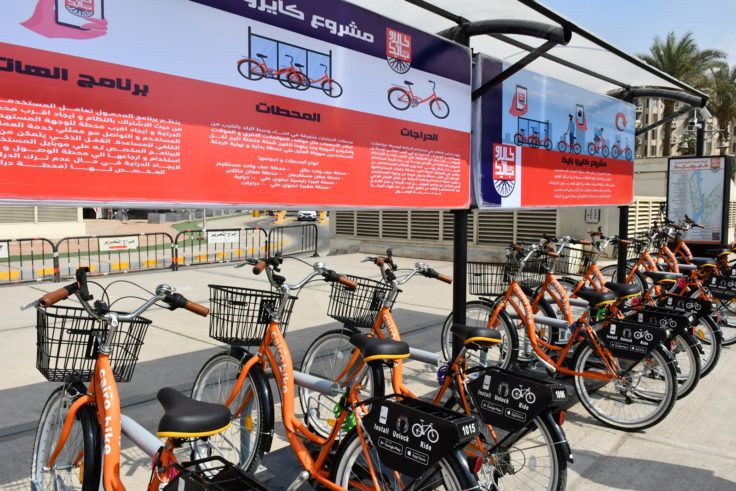
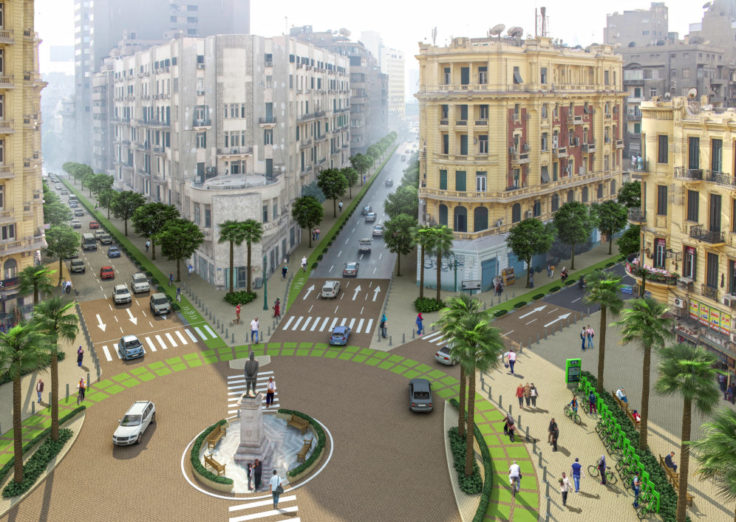
The first phase of Cairo Bike is being implemented in October 2022 with 250 bicycles and 26 stations. The aim is to have 500 bicycles distributed over 45 stations following the second phase, with all stations powered by solar energy and secured with surveillance cameras. The system’s coverage area will include over six square kilometers across downtown Cairo, El-Sayeda Zainab, Garden City, and Al Attaba. Users can hire a bicycle for 1 Egyptian pound (about USD 0.05) per hour through a mobile application or a prepaid card. Payment options include use of credit card via the Donkey Republic application or prepaid cards that can be acquired and recharged with cash at the bikeshare stations. The multiple payment modes are expected to promote inclusivity among diverse income groups, allowing for more equity and accessibility for residents and visitors alike.
Bikeshare stations are placed strategically in the city close to metro stations, bus terminals, and public spaces to ensure easy access and promote multi-modal travel options. The bikeshare system has the potential to improve accessibility in central Cairo by creating first- and last-mile options while extending the reach of the metro and bus systems. To promote more inclusion and participation in the system, the city has also embarked on a public campaign highlighting the economic, environmental, and physical benefits of cycling with a particular eye towards addressing gender barriers. Since women in the region are less likely to have independent means of efficient travel and have differing mobility needs than men, Cairo Bike can significantly expand the commuting options of women across the city. To this end, Cairo also plans to offer bikeshare membership discounts, host educational cycling events, and involve more women in transport decision-making.
The Cairo Bike launch comes ahead of Egypt’s hosting of the 27th session of the United Nations Climate Change Conference (COP27) in the city of Sharm el-Sheikh in November 2022 and calls attention to the need for investment in cycling as an essential, low-carbon transport mode. The city is also planning the construction of 14 kilometers of protected bike lanes to support both Cairo Bike users as well as other cyclists in the city. An ongoing priority will be to develop more comprehensive policies and interventions to ensure that drivers and other motorists recognize and share the road with cyclists.
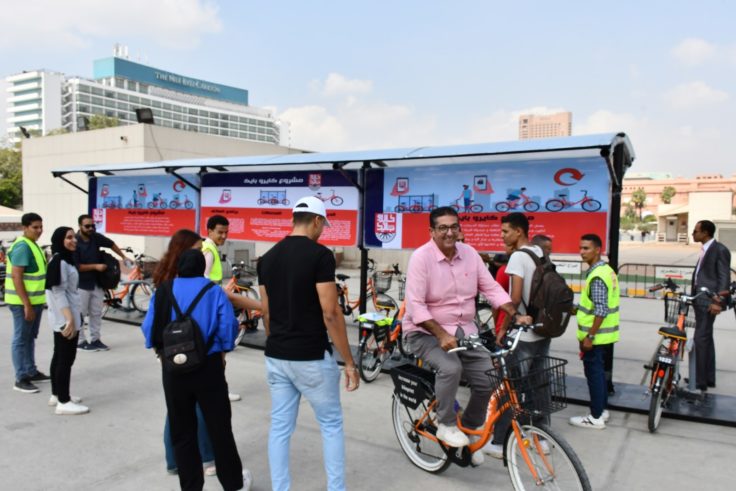
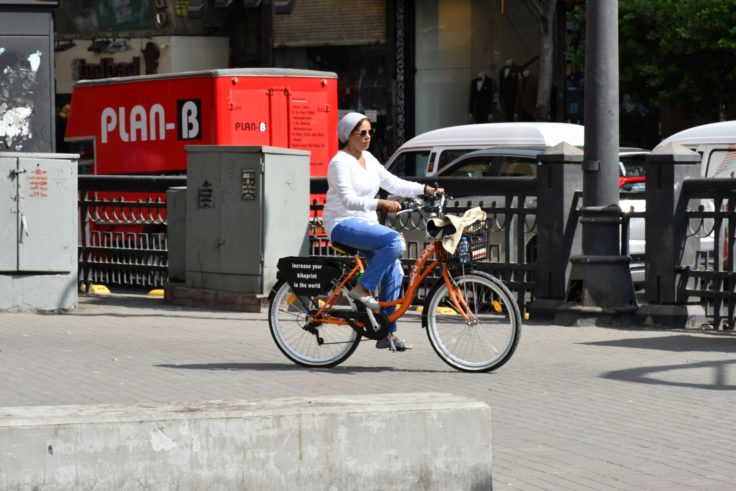
Cycling Expands in Kigali and Addis Ababa
Cairo Bike’s launch demonstrates promising progress in non-motorized transport investments in the region and sets an example for cities across Africa. ITDP and institutional and government partners are helping to create frameworks for bikeshare programs that will make cycling a more visible and accessible mode of transport in other cities. In Kigali, Rwanda, ITDP, the City of Kigali, and Solutions Plus are working on a financial feasibility assessment that will help the city expand the existing GURARIDE bikeshare system under a new and improved business model. In addition, 50 e-bikes will be added to the fleet to make cycling easier, considering the hilly geography of the region.
In Addis Ababa, Ethiopia, ITDP is working with the country’s Ministry of Transport and Logistics and other government agencies to implement a Bisklet Megarat bikeshare pilot project in the vicinity of the Churchill corridor, making use of an existing 150 e-bikes procured earlier by the government as part of the Addis Ababa city mega-project. Of these, 30 e-bikes are planned to be operational for the Churchill pilot bikeshare project. ITDP is leading the planning and development activities and has prepared an action plan evaluating the coverage area; station locations and sizes; system features; business models; a fare collection system; cost estimates; funding sources; and an implementation process. The installations of the charging stations and the parking stations are currently underway. The project will be launched after the upgrading of the existing cycle lanes on Churchill Avenue and the selection of experienced local or international operators.

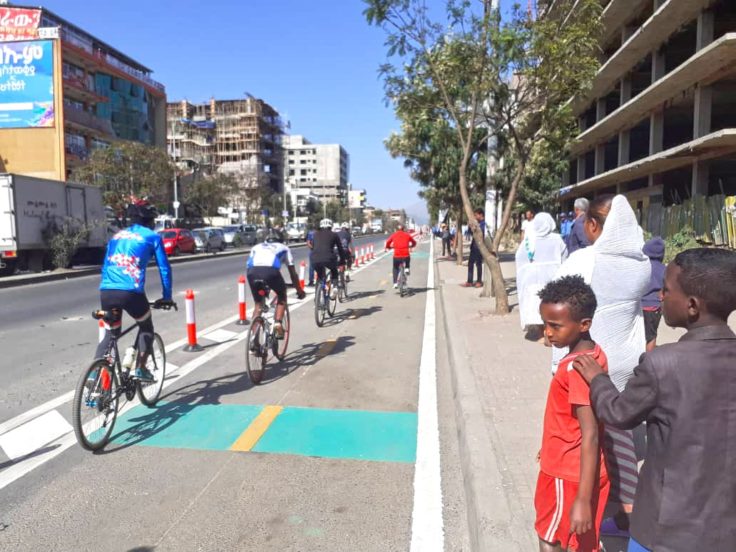
Today, many urban governments around the world are looking for ways to introduce more sustainable mobility options to improve the quality-of-life for their people. In Africa, strategic planning for bikeshare systems alongside supportive cycling infrastructure has immense potential to improve safety, health, and access for people living in cities. As a low-carbon transport mode, increasing cycling would also help to address climate change while providing a number of related economic and social benefits. While there are still many challenges to creating streets that are truly cycling-first, the steady piloting and expansion of bikeshare in cities like Cairo, Kigali, and Addis Ababa offer promising forward momentum. With the right policies, infrastructure, and resources, an Africa that is more cycling-friendly would not only significantly reduce emissions, congestion costs, and road fatalities, but also improve the quality-of-life of all Africans.
Cairo, Kigali, and Addis Ababa are all partners of ITDP’s global Cycling Cities campaign — learn more here.
